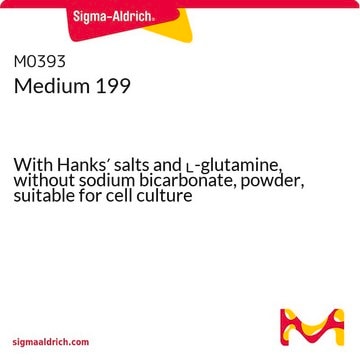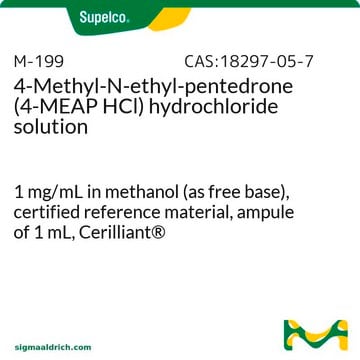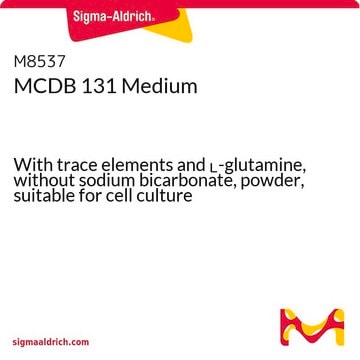M3769
Medium 199
Modified, with Earle′s salts, without L-glutamine, sodium bicarbonate, and phenol red, powder, suitable for cell culture
Sinónimos:
M199 Medium, TCM 199
About This Item
Productos recomendados
Quality Level
form
powder
technique(s)
cell culture | mammalian: suitable
components
L-glutamine: no
phenol red: no
HEPES: no
sodium pyruvate: no
Earle’s salts (5% CO2): yes
NaHCO3: no
shipped in
ambient
Storage temp.
2-8°C
¿Está buscando productos similares? Visita Guía de comparación de productos
General description
Application
- to culture the primary human umbilical vein endothelial cells (HUVECs) for use in cell viability assay
- to flush the uterine horn of gilts to recover day 12 conceptuses from uteri
- to culture the peritoneal cells and immortalized human mesothelial cells (MeT-5A and ATCC-CRL-9444)
Quantity
Reconstitution
also commonly purchased with this product
supplement
Storage Class
13 - Non Combustible Solids
wgk_germany
WGK 1
flash_point_f
Not applicable
flash_point_c
Not applicable
Certificados de análisis (COA)
Busque Certificados de análisis (COA) introduciendo el número de lote del producto. Los números de lote se encuentran en la etiqueta del producto después de las palabras «Lot» o «Batch»
¿Ya tiene este producto?
Encuentre la documentación para los productos que ha comprado recientemente en la Biblioteca de documentos.
Los clientes también vieron
Artículos
Medium 199 supports non-transformed cell cultivation in virology and vaccine production, offering broad species applicability.
Medium 199 supports non-transformed cell cultivation in virology and vaccine production, offering broad species applicability.
Medium 199 supports non-transformed cell cultivation in virology and vaccine production, offering broad species applicability.
Medium 199 supports non-transformed cell cultivation in virology and vaccine production, offering broad species applicability.
Protocolos
Powdered media and salt mixtures are extremely hygroscopic and should be protected from atmospheric moisture.
Nuestro equipo de científicos tiene experiencia en todas las áreas de investigación: Ciencias de la vida, Ciencia de los materiales, Síntesis química, Cromatografía, Analítica y muchas otras.
Póngase en contacto con el Servicio técnico








